Please note: This site is still in development.
Hey teachers and teacher’s aides, and oh yeah, school administrators too, Micko really believes we can create a world of Love and that helping young clowns understand and increase their Love Flow is the most important role in that process.
You may be wondering what Micko means about the Flow of Love. For Micko, Love Flow happens every time a clown feels empathy for other clowns, cares about other living things, does something nice, shows respect to others even if they are different, feels positive connections with others or feels compassion for others and tries to help them.

Micko wants you to open your minds to the possibility that by helping your young clowns learn to understand and increase their Love Flow you and they will be adding to the World Love Flow.
Micko weeps tears of Love when meditating on a World of Love that could evolve after many future generations of helping young clowns increase their Love Flow.
How open-minded are you? Are you willing to open to the possibility that you could play an important role in this process?
Mentally check the right box:
[] No, I’d rather play games on my phone.[] Yes, tell me more.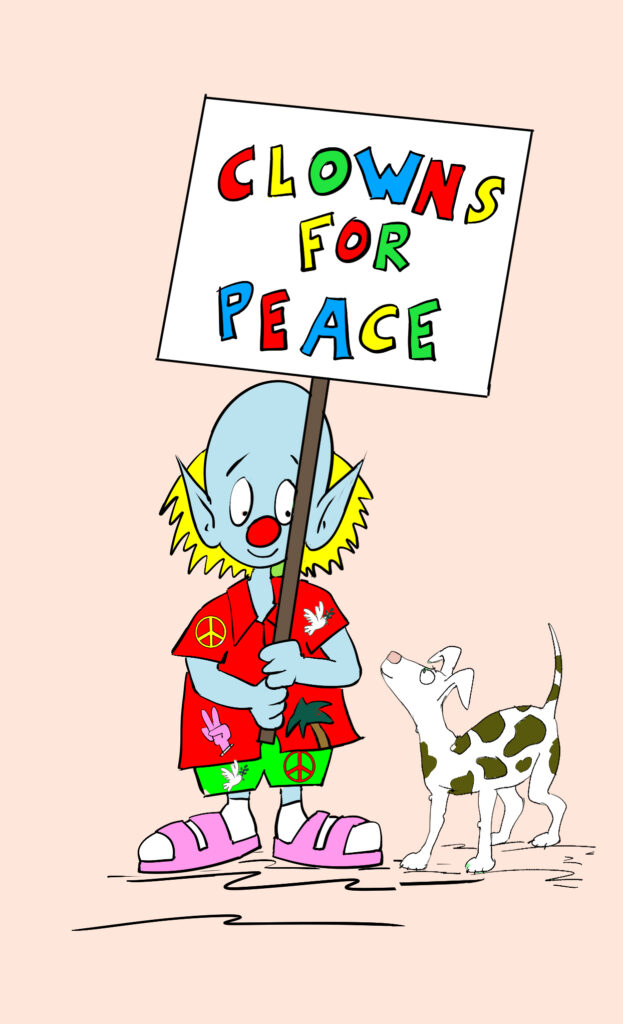
You may be doing things in your classroom that focus on the Flow of Love, or you may see examples of caring, empathy, being nice, making friends, or compassion and helping…please share it here so we can start a discussion!
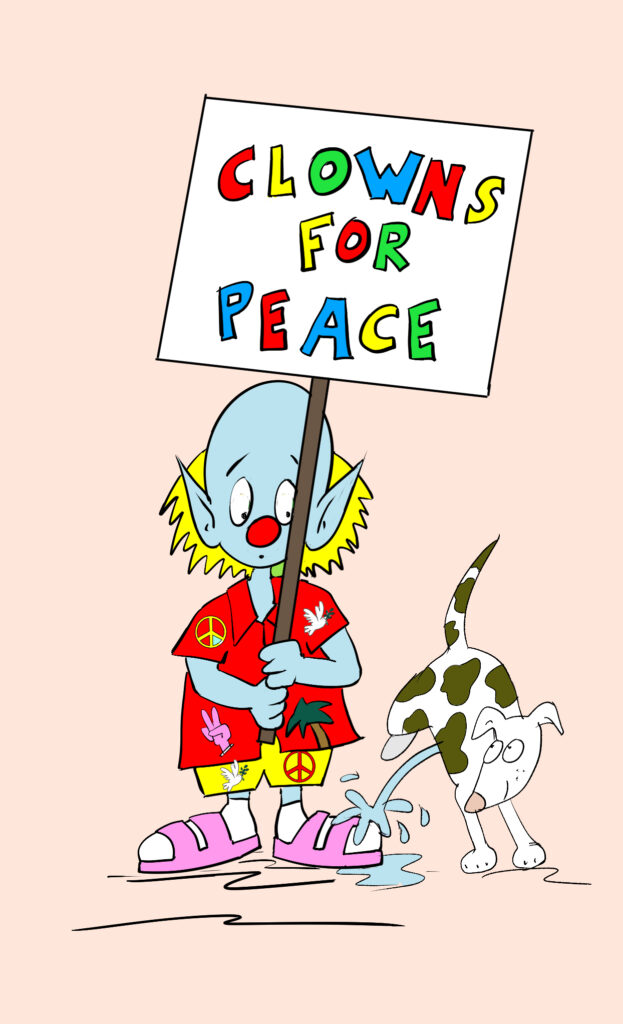
More about the Flow of Love
In the section The Flow of Love Micko explains that Love flows like water in a garden hose—it can be prevented from flowing, it can flow a trickle, or it can flow full force,
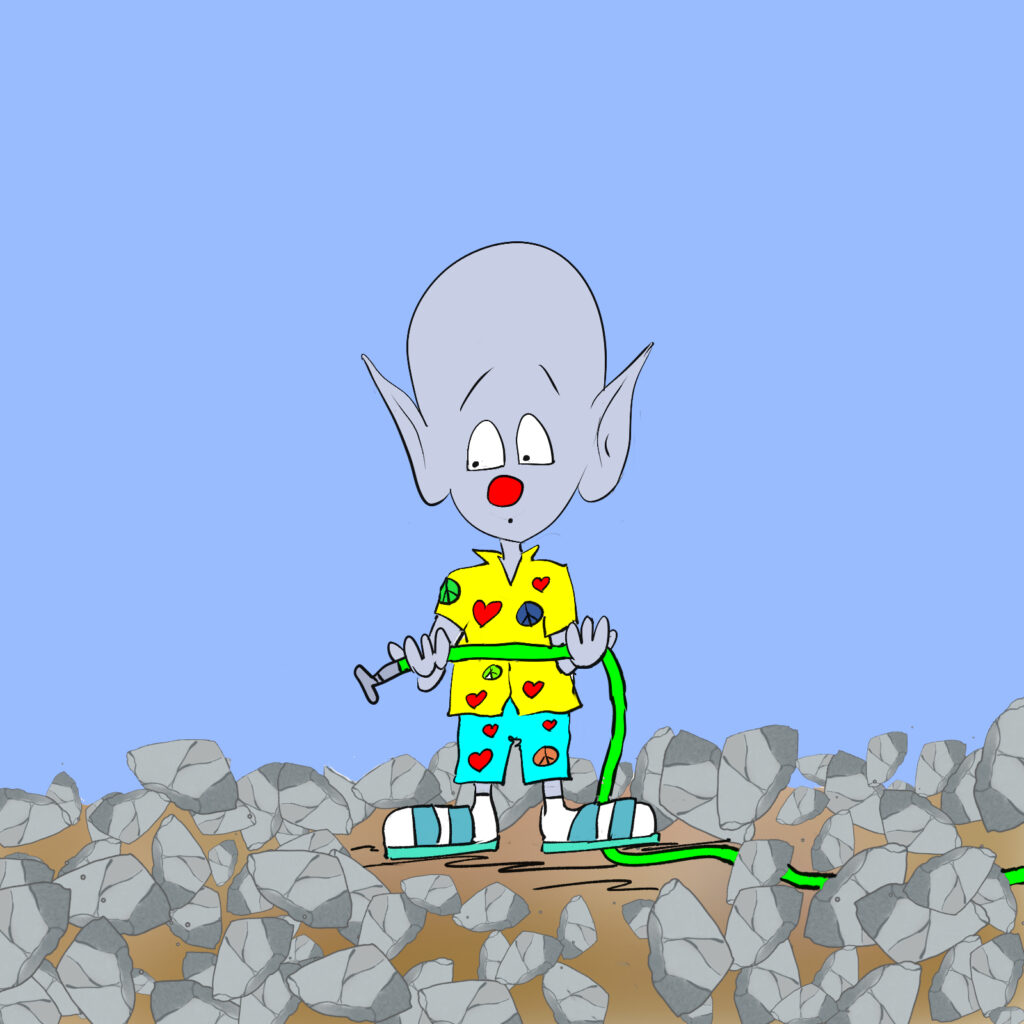
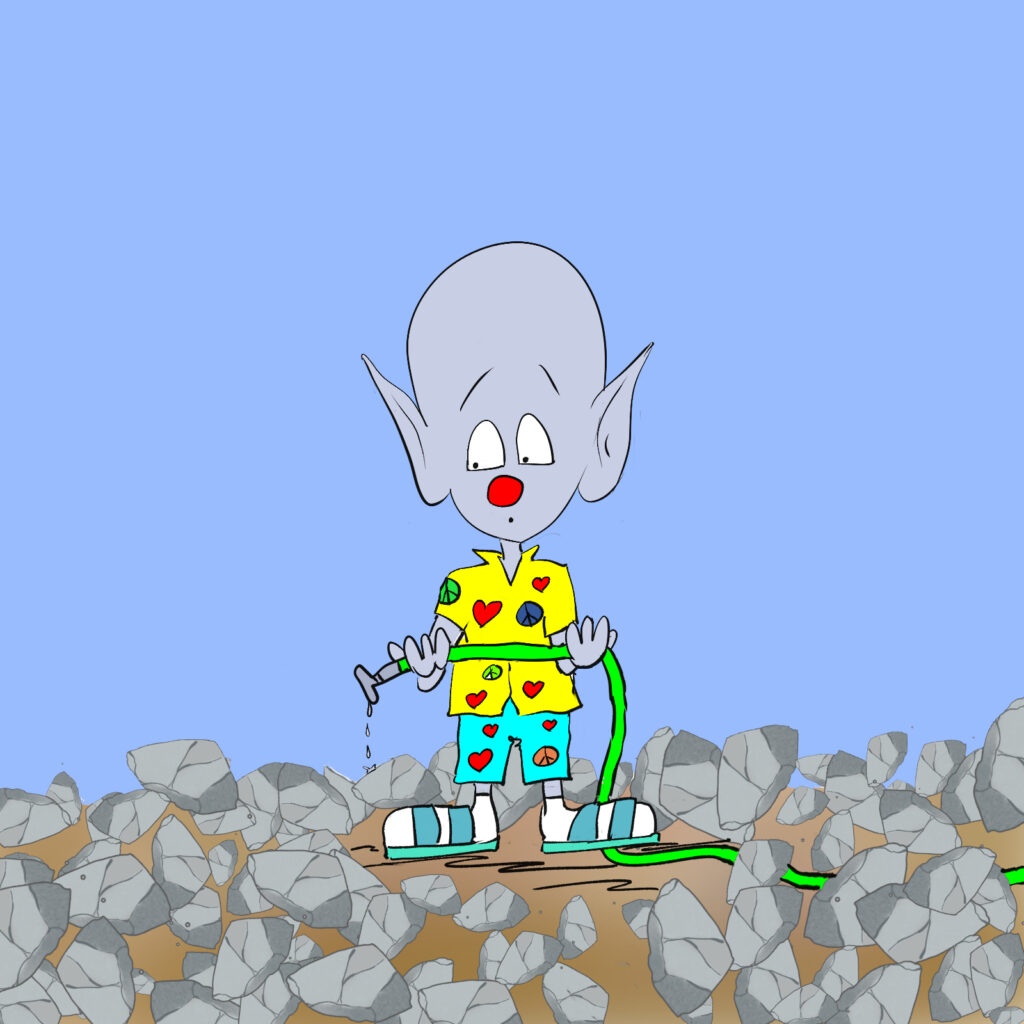
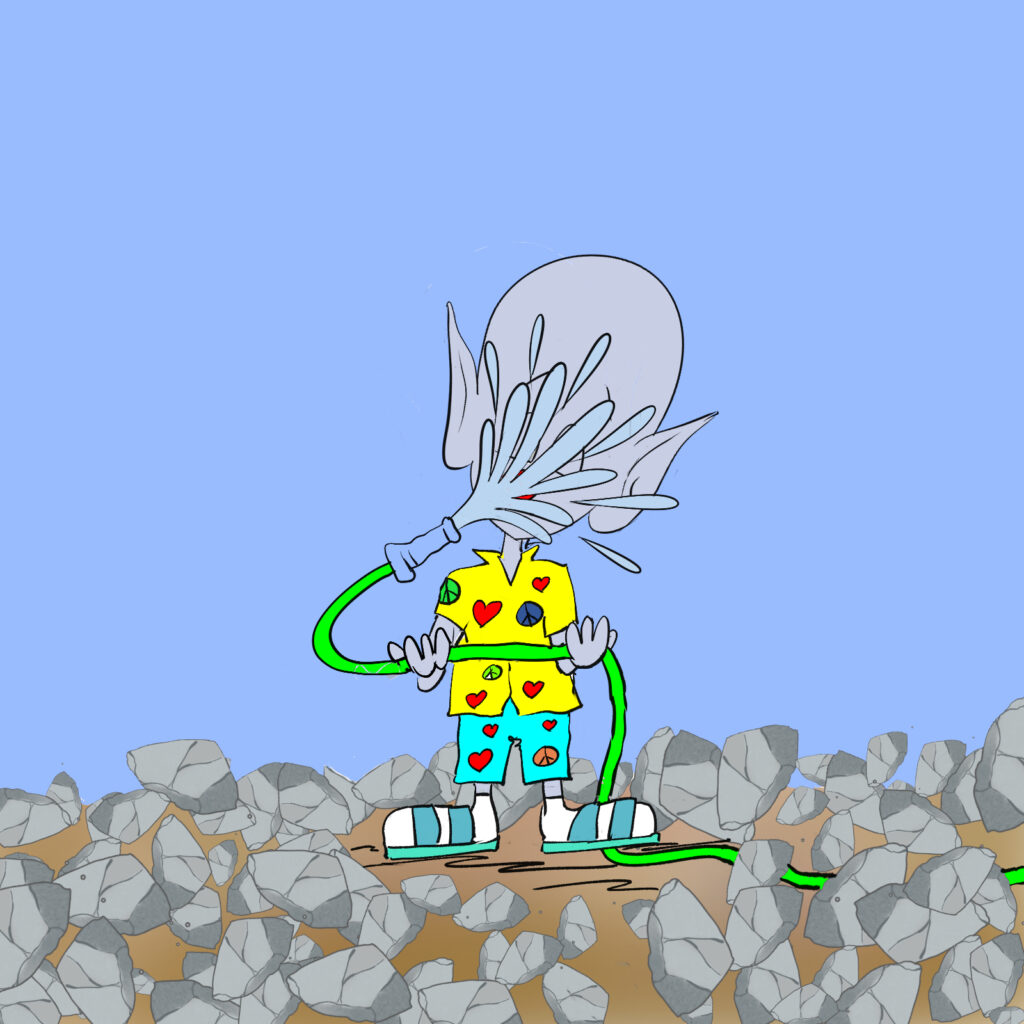
And Micko also suggests there are three kinnds of Love: Self-Love, Other-Love, and World-Love.



Take a few deep breaths…
What are you feeling?
What are you thinking?
Let’s talk about it. Micko wants to know what you are feeling and thinking.
Leave a Reply Cancel reply
Why are young clowns the key to creating a world of Love??
As you already know, young clowns soak up information like sponges soak up liquids. Sponges don’t care what the (liquid is, if it’s a liquid the sponge will soak it up ( (although they Love seltzer).
Same thing with young clowns—their brains will soak up whatever information we present to them. Different languages, different customs, different world views, different beliefs about the correct way to put toilet paper in the holder—doesn’t matter, their young clown brains will soak up that information.
This is an illustration of a young clown brain that has NOT YET been presented with information about the Flow of Love,
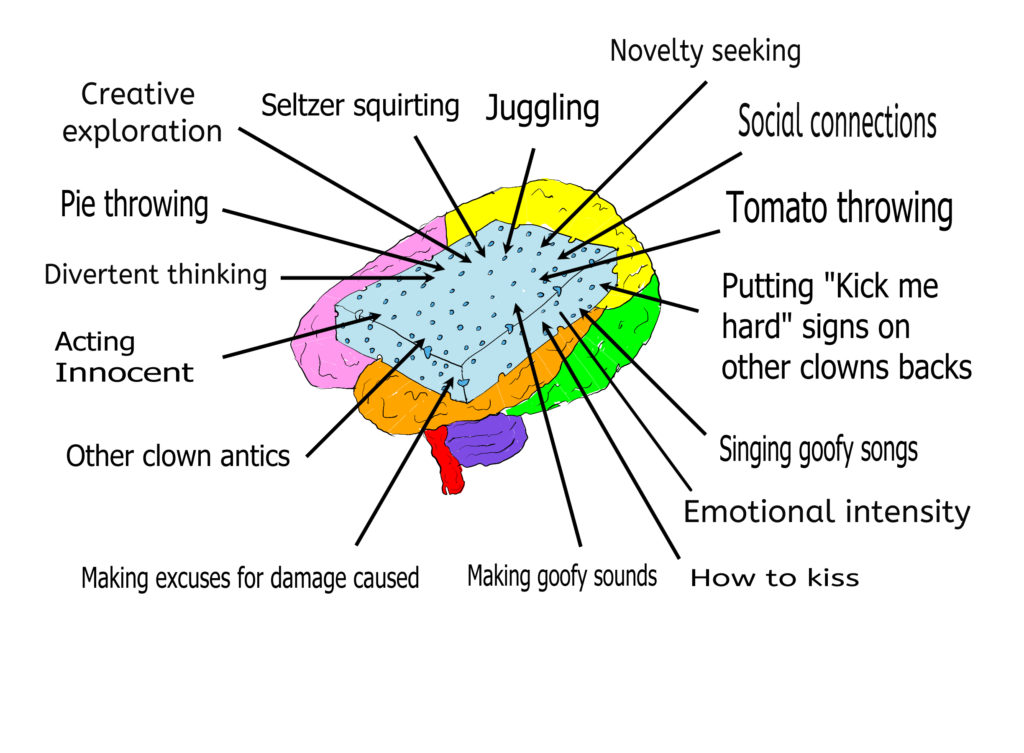
Micko says it’s so simple: All we have to do is help our young learn to share their love.
Every interaction with another clown or group of clowns or other living things is a chance to create a full Flow of Love for those involved and add that Love to World Love Flow.
In the illustration below you see a young clown brain that HAS absorbed information about the Flow of Love.
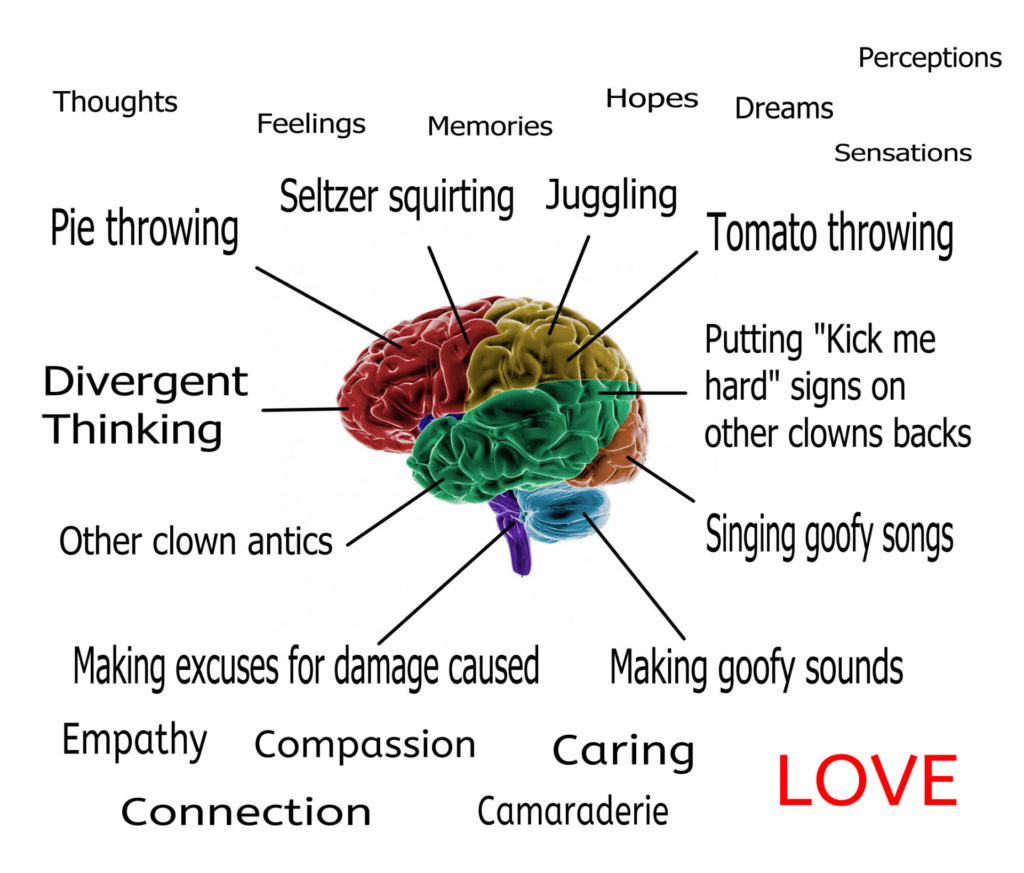
Are there any clowns still with us? Please raise your hands so we can do a head count.
Thanks for being open-minded enough to stay with us so far!
Hopefully, you are beginning to buy into Micko’s notion that we can create a world of Love!
Let’s have a discussion! Micko wants to hear what you are thinking and feeling!
Leave a Reply Cancel reply
Helping young clowns understand their Love Flow
Our AI tells us there are 7 clowns still with us…and several clowns have made comments and we have had several reflective dialogs.
And 590,000 clowns have left the site to check their social media contacts.
Thanks so much for your open-mindedness.
There are 3 elements in the learning process Micko suggests teachers, parents, and others facilitate with young clowns to understand Love Flow in their lives: Book learning, learning from experience, and Leaarning about ones potential.
Book Learning
class presentation/dinner
print pages, workbook?
teaching moments,
Learning from experience
Recognizing life experiences that manifest liking someone, empathy, sharing, being friendly, having compassion for someone in a situation and wanting to help.
Reflective dialog about past or present experience of these ideas (Link).
role play
Learning about one’s potential
Actions to increase Love Flow for self, others, world–Love Experiments
OUTCOMES–this is where young clowns look at the outcomes of their Love experiments and how meaningful they are.
This is the key thing with young clowns doing their Love Experiments!
Monitering outcomes
How feel?
What think about outcomes?
Our AI tells us there are 7 clowns still with us…and several clowns have made comments and we have had several reflective dialogs.
And 590,000 clowns have left the site to check their social media contacts.
Thanks so much for your open-mindedness. There are 5 things that Micko believes are important for a young clown to understand and guide their Love: Integrated Identity, Mindsight, Lovesight, Love spirals, and making up one’s own mind..
Integrated Identity
Micko thinks that we can take steps to create more Love Flow in our world and that each of us clowns should find our own way to do this.
Micko thinks one of the most important things we can do is to adopt what FlowingLove (Daniel Siegel) calls an “integrated identity”. For short, FlowingLove calls this ‘MWe”, signifying an identity that includes me, we (other clowns) as well our world. FlowingLove points out that we do not lose our personal identity when we do this, it becomes integrated into a larger identity.
This is a mental act.
Some clowns already understand that each of us individual clowns are connected to every other clown and to our world. But many clowns believe that each of us is a separaate being with no connection with others.
Micko believes that if we are to move forward toward a World of Love we need to adopt an identity that integrates ourselves, others, and our world. FlowingLove, LoveBlossoms, and QuantumLove all believe this. [link] add comment box
Mindsight
According to FlowingLove (Daniel Siegel) Mindsight is a way we can understand what is going on in our inner mind and the inner minds of other clowns- thoughts, feelings, perceptions, sensations, memories, and hopes and dreams.
FlowingLove describes how clowns make mental maps, or mindsight maps, of what we see and hear and also of the mind: our own mind and the mind of others, how we sense others’ feelings, thoughts, and memories, and how we see that others have minds tool
FlowingLove and MIcko believe we can help young clowns learn to use their Mindsight to understand and utilize their own minds and the minds of of others.
You may have some experience with your young clowns, either in the classroom or in your family, regarding this type of mental processing. Please share here so we can have a discussion!
FlowingLove says there are 3 types of mindsight maps:
– A Me map, for insight, self-awareness, and self-knowing.
– Maps of You for empathy, caring, and compassion
– A map of Us for the way we think, imagine, reason, and behave knowing we are a part of a larger whole. This allows us to sense and care for the larger social good.
FlowingLove and MIcko believe we can help young clowns learn to use their Mindsight to understand and utilize their own mind and the minds of of others.
Furthermore, focusing our attention on these mindsight maps creates neural circuits in our brains that change the structure of our brains. FlowingLove says that developing mindsight activates the circuits that underlie empathy and compassion.
Virtually any clown develop mindsight, even very young clowns and very old clowns! FlowingLove says it’s never to late to learn hindsight!
FlowinigLove says that Mindsight can be cultivated by putting in time, effort, and practice: For most clowns, adults, and very young clowns, the ability develops through everyday interactions with others, especially through attentive communication with parents and caregivers, and eventually teachers. When the adults are in tune with the young clown, when they reflect back to the young clown an accurate picture of the young clown’s inner world, the young clown comes to sense the young clown’s mind with clarity.
FlowingLove also suggests a strategy he named SIFT. it is a way of “sifting through what is happening in one’s mind. ‘S’ stands for sensations, ‘I’ stands for images, ‘F’ stands for feelings, and ‘T’ stands for thoughts. A clown could use this to help focus on the sensations, images, feelings, and thoughts in the clown’s mind.
You may have your own experiences helping young clowns understand their feelings, thoughts, perceptions, memories, sensations, images, attitudes, beliefs, hopes, dreams, and desires.’ Please share them here so we can have a discussion.
Leave a Reply Cancel reply
lovesight
Micko says that Lovesight is a special type of Mindsight. Lovesight allows us to see the Flow of Love within ourselves, within other clowns, and between us and other clowns, things like caring, empathy, sharing, compassion with the desire to help or fix others’ situations, and forming a connection with other clowns or animals.
As with Mindsight, clowns can make Lovesight maps of our own Love Flow, the Love Flow between us and others, and the Love flow between us and the world, as we sense caring, empathy, sharing, compassion, and helping.
Please share any experiences you’ve had in your teaching regarding empathy, caring, and compassion for ourselves, others, and our world.
Focusing our attention on these Lovesight maps creates neural circuits in our brains that change the structure of our brains, literally adding thousands of neural circuits dealing with caring, empathy, sharing, compassion, connection, and helping. In other words The Flow of Love..
Lovesight can be cultivated by putting in time, effort, and practice, through everyday interactions with others, especially through attentive communication with parents and caregivers, and eventually teachers. When the adults are in tune with the young clown, when they reflect back to the young clown an accurate picture of the young clown’s inner world, the young clown comes to sense the young clown’s mind with clarity.
As teachers, you can help your young clowns understand their Love Flow!
Micko has created an original acronym to help clowns look inside their minds: SKETCH.
‘S’ stands for share, ‘K’ stands for kind, ‘E’ stands for empathy, ‘T’ stands for tenderheartedness, ‘C’ stands for care or connection, or compassion, and ‘H’ stands for ‘helping’.
The word does not have a special meaning but it was the only word Micko could come with with the letters.
Clowns could us this acronym to help them look inward to see their love Flow and to see other clowns’ Love Flow.
And, like mindsight, very young and very old clowns can learn Love Sight!
Things you might try:
– paper exercises
– a workbook
– group discussions
– roleplay
– spontaneous discussions of Love Flow that happens
Maybe you already do activities that promote Love Flow or you may notice examples in your class that manifest feelings, thoughts, perceptions, memories, sensations, images, attitudes, beliefs, hopes, dreams, and desires. each one of these could be a topic of discussion or exercises. These examples may not be conscious, but if they are brought to consciousness this allows transforming inner life in a positive direction.
Please share so we can have a reflective dialog!
Leave a Reply Cancel reply
Upward Spirals and Love Spirals
Upward spirals are how Love Flows the best.
Upward spirals happen when one positive event leads to another positive event, which then leads to another positive event, etc. Three or more cycles become a spiral.
For instance…BumbleBee falls down some stairs, and finds some money at the bottom. Right then another clown, TripsyDipsy falls down the stairs and the two of them collide. TripsyDipsy starts crying and BumbbleBee feels caring feelings, empathy, and compassion and wants to help TripsyDipsy feel better, so BumbleBee decides to use the money to buy them each an ice cream cone, making them both very happy.
They chat and get to know each other as they walk around a public park. They share personal experiences of falling down stairs and begin to experience a special connection with each other.
They are so engaged in their reflective dialog that they don’t see the sign saying beware of the cliff and they both walk over the cliff.
At the bottom, they burst out laughing and hug each other. Then, to cement their new friendship, they exchange social media info.
Because this upward spiral included caring feelings, empathy, compassion, and a special connection it becomes a Love Spiral.
Micko believes that you, as a teacher, have the opportunity to help your young clowns create their own personal Love Spiral.
Love Spirals can involve Self-Love, Other-Love, or World-Love.
Say a clown decides to try laughing yoga with a group of other clowns, and afterwards the clown is still laughing and feeling better. So the clown decides to try it again the next week and sure enough the clown feels better and ends up going every week. The clown experiences increasing positive feelings, increasing motivation to continue, and increasing self-liking. This is a Love Spiral focusing on Self-Love.
LoveBlossoms (Barbara Fredrickson) talks about a situation in which one clown helps another clown, and another clown witnesses the helping. The helping clown will probably feel positive feelings of empathy, compassion, and helping, The clown being helped will likely feel gratitude, and the witnessing clown might feel uplifted.
If they spend a few moments getting to know each other they will likely feel a connection with each other and also increasing positive emotions. This is a Love Spiral involving Self-Love and Other-Love,
Yet another clown decides to take a walk in nature to calm the mind. The clown does experience a calmer mind as the mind focuses on the smells and sounds of nature, the feel of the breeze on skin, and sight of a Skunk family walking across the path. The baby skunks are so cute the clown picks one up and pets it. The clown feels great Love for the baby skunk, trees and plants and breeze and bird songs and all of nature! This is a Love Spiral involving Self-Love, Other-Love, and World-Love.
Micko believes that any clown can create their own Love Spiral.
More importantly, Micko believes that you, as a teacher or educator, can help your young clowns learn how to create their own Love Spirals.
Leave a Reply Cancel reply
Young clowns making up their own minds.
Micko thinks this is extremely important.
It is important for each young clown to be able to explore possibilities in their own way without some clown telling them what to do. Such an open process will allow each younger clown to grow more and find more of their clown potential.
And it is important for the future of Clown Nation for the same reason: over the future generations if young clowns are allowed to explore possibilities in an open way, Clown Nation will find more of Clown Nation’s potential.
This will then become a major shift in clown cultural evolution. Shifts in clown culture will influence individual clown’s search for understanding, and open-minded searching for understanding on individual clowns’ part will influence clown culture.
What do you think? Will you share some examples of making up one’s own mind from your own teaching experience so we can have a reflective dialog?
Leave a Reply Cancel reply
LINK TO MORE DETAILED INFO:
If you want to learn more about how your role as an educator will help us create a world of Love go to Clown Culural Evolution.
Helping young clowns increase their Love Flow.
Other important things you probably already know:
Please share your own experiences with these suggestions, let’s have a reflective dialog!
Leave a Reply Cancel reply
Explaining
Nice, kind, care, empathy, compassion/help, patience, tolerance of difference
Self love, other love, world love
Lovesight
Cartoons for each (handouts, worksheets
Talk about personal experiences
Worksheets
Notebooks (handouts)
? not sure about those 5 things…
Highlighting Love Flow in classroom and playground and community
Love Experiments
Don’t take Micko’s word for it, Have your young clowns try some Love Experiments to help them learn how to increase their Love Flow.
This is where your caring, empathy, compassion, and creativity allow you to help your young clowns to be excited about their Love Flow!
Let your excitement show! It will help your young clowns be excited and that will affect your excitement as well…a spiral process!
This is the synergy of spiral processes: you have positive emotions helping your young clowns, they, in turn, are affected by your positive emotions, which are combined with the positive emotions they feel due to the love experiment, and your excitement and positive emotions will also increase! A Love Spiral!
[] relate this to unfinished section above on spiralsHave group discussions about your young clowns’ Love Experiments. Talk about their Love Flow (caring, empathy, sharing, compassion and helping, and connection to other young clowns). Share your experiences. and ask young clowns to share their experiences.
This could be spontaneous discussions or planned discussions, such as in a morning meeting or class.
This will increase the spiral dynamics due to so many clowns sharing their positive experiences. This is what LoveBlossoms (Barbara Fredrickson) calls connection or LoVe.
You can print images from this site to your young clowns to discuss.
This could be in a group or for individuals to process. You can use your creativity to find ways to relate images to your personal lives.
Maybe each young clown could have a workbook or exercises.
individual work
You could create experiential exercises such as reflective dialogs
Skits or longer plays would be great ways to help young clowns process empathy, caring, sharing, compassion, and helping, mindsight and Lovesight.
new idea: more focus on good sites online
my imagination journal
the compassion project
Evaluating outcomes
Micko feels it is essential for young clowns to make up their own minds about whether a Love Experiment works for them or not.
Micko suggests you present to your young clowns a simple question to ask after trying any Love Experiment: “Did this Love Experiment make me feel better, the same, or worse? “
In the following comic strip BumbleBee is trying out a gratitude routine that the teacher recommended. Gratitude routines have become very popular and research shows that many clowns report positive outcomes from doing them.





















-Meditation
-Mindfulness
-Laughing yoga
-Yoga
-Chair yoga
-Eliminate negative thinking with positive thinking/dispute
-Relaxation
-Personal growth activities
-Fun activities
-Healthy nutrition
-Exercise
-Nature
-Positive self-affirmations
-Loving-kindness towards Self
-Therapy
-Gratitude
-Cultivating optimism
-Acts of kindness/cultivate kindness
-Nurturing social relationships
-Strategies for coping
-Forgiveness
-Making amends
-Increasing Flow activities
-Savoring Joy
-Committed goal pursuit
-Create high quality connections
-Strengths
-Visualize your future
-Joy portfolio, others
The rest of this section
is still in development.
Five rules in this approach
Rule 1: There are no rules!
But there are a few guidelines Micko highly recommends.
Micko believes it is essential for young clowns to make up their own minds, not have an adult clown make it up for them. To hear more go here.
You probably already know about scaffolding, but just in case you don’t, Micko recommends to use scaffolding as you help your young clowns understand and guide their Love Flow.
To learn more go to Scaffolding.
Another guideline Micko highly recommends is Role modeling.
Micko believes it is essential for you as a teacher of young clowns to be creative and tailor your lessons to your young clowns and your situation.
The rest of this section includes 3 sub-sections:
1. Main concepts involved
2. Methods
3. Classroom materials
Main concepts
1.Flow of Love meme-go to home page and follow links for info on how Love can flow a trickle, full flow, or be prevented, and can be self-love, other-love, or world-love.
2. Mindsight
3. Lovesight
4. Micro-moments of connection (Love)
5. Feeling felt
6. Synergy
7. Taking charge of our Love Flow
our individual Love Flow
World Love Flow-Explicit in our awaareness
8. Expanded ID
8. Young clowns as problem solvers.
9. Young clowns as cultural evolutionists.
10. Clown cultural evolution.
11. Something new emerging in clown evolution
12. Young clowns can learn empathy and compassion.
Methods
- Open discussions, individual and troupe, “reflective dialogues”-see classroom materials section below.
Individual discussions.
Troupe discussions. - Teaching moments
- Love experiments
- volunteering
- mindfulness
- reflective dialog
- Open discussions, individual and troupe, “reflective dialogues”-see classroom materials section below.
- Sifting the mind
- Mental maps
- Action groups
- time in
- Quizzes???
- games,
- puzzles,
- challenges
- art, drama,[] journal writing, etc.
Classroom materials
The classroom materials.
Each on one page.
Print my blog
Text, image, print button.
the first 9 examples of trickle, flow, prevent X Self-love, Other-Love, World Love.
[] link to pages as needed
- trickle
- prevent
- full flow
- Self-love
- trickle
- prevent
- full flow
- Other-Love
- trickle
- prevent
- full flow
- World-Love
- trickle
- prevent
- full flow
- mindsight
- x 6
barriers
anger
sadness, depression
anxiety
- x 6
- lovesight
- examples
- micro-moments
- examples
- feeling felt
- synergy
- win lose
- win lose
- all win
- DS exercises
- Sifting the mind
- Time in
- Mental maps…shape of head/brain, write or draw in side; mindsight and lovesight stuff. Self and others. relate to lives. discuss.
- BF exercises
- SL exercises
- LM exercises?
- BabyLove (Mary Gordon) exercises (The roots of empathy)
- Mental maps…shape of head/brain, write or draw in side; mindsight and lovesight stuff. Self and others. relate to lives. discuss.
- Many cartoons about emotions, facial expressions, body posture, etc. Emotional literacy.
- The main emotions. Core emotions: sad, scared, angry, happy
- Observe, talk, discuss, express verbal or art or other?
- Personal accounts of emotions.
- consensus building;
- negotiating
- 43 [] self-appointed “peacemakers”
- take charge of own problem solving
- what is happening
- what is going to happen
- temperament x 9
- Observing someone’s experiences and emotions,
- naming the emotions,
- anchoring the emotion in themselves privately through discussion, reflection, art, and journaling 125
- discussing their feelings with others
- Research showing that understanding emotions leads to improved cognitive abilities 127
- Group scenes
- see quote
- group scene that can be separaated into indivudals or smaller groups
- “Emotional barometer” of class 121
- Authentic communication
- [] Shown a pic
- Tell me about this pic
- How do you think the person feels?
- If the person could talk to you, what do you think the person would day/
- What would you say to the person
- Allows the person to take the lead and direct the conversation
- Feels vague in the explanation, although I get the idea of open ended questions
- Real communication happens at emotional level… “When we share our feelings, opinions, values, and deeply held beliefs with one another, we ae able to relate as human beings. Authentic communication is supportive to the growth of social and emotional competence and a basis for developing empathy.
- [] Seeing adults cry
- A quote of what Dr. Robert Glossop of the Vanier Institute of the Family in interview of one of the Roots of Empathy newsletter “There are two kinds of social capital. There is the bonding type, which is to feel closely affiliated with those who are like you, and there is the bridging type of social capital, which is to feel closely affiliated with those who are different from you” 143 [relate this to expanding circles in Better angels]
- Bridging 160
- Focusing on differences
- More here about inclusion in general…
- [] 147 born excluded. 149 break intergenerational patterns.
- Born with disabilities 150
- Not being picked, bullying, etc. 156
- Cruelty, condoning if do nothing 157
- Discus fair, right, just, empathy 159
- Values goals in game, kindness, other 160
- Peacemakers
- Types of bullies
- Kids challenging bullying 175
- Teachers share own experiences 177
- Discuss helping
- Storytelling
- Groups discuss how to handle, help victim, message to bully
- [All children can be leaders, create groups, each child chance to be reporter, kids who don’t have confidence to speak out, (kids who tend to speak out a lot-micko) 197
- [] Coming to consensus in group 198
- Teachable moments 204 learning begets learning
Find each kids interest, strengths
- Citizens of community 217
- Internal compass [] use as metaphor and image…choices, values…221
- strategies for coping,
- forgiveness
- find your flow
- honor your strengths
- visualize your future
- create a love portfolio
- spirals?
The rest of this section
is still in development.
That is why it is so important to help younger clowns understand and learn to guide the Flow of Love in their own lives starting early in their lives.
Micko believes that if we do this they will become more loving toward themselves and to others, and it will make them healthier and make the world more harmonious.
image: adult, younger clowns, toilet paper demonstation
Secondly, Micko says that we need to create a generational Love Spiral if we want a world of Love and Peace.
By helping young younger clowns understand and guide the Flow of Love, they will grow up as more loving clowns, and then pass on this attitude to the younger generation of younger clowns.
This can happen generation after generation. FlowingLove (Daniel Siegel) believes that if we adult clowns help our younger clowns, they have the potential to create more imaginative ways to solve the problems we face, as well as meaningful ways to inspire their generation and the generations that follow. [ ] link to more.
Micko believes this will lead to the generational spiral. (link)
toilet paper, next generation?
doesn’t fit content?
Understanding barriers to the flow of Love.
general outcomes that will emerge within a Mindsight focus;
specific focus on barriers to flow of Love
fears, anxiety
low self-esteem, confidence, self-efficacy
beliefs, perceptions, bias, preconceptions
worldview
present situations for discussion re. why not flow?
cartoons
create interactions with others that allow/foster flow
recognize lack of connection…why?
[ } establish inward looking at lack of connection.
Repairing ruptures 213
281 the big 7?
Empowering young clowns by helping them understand integrated identity.
Empowering your younger clowns to become change-agents:
- exploring inner via art expression
- Social Engagement
- Social helping/volunteering
- Teaching mindsight
- Engagement with life situations with discussions/classroom activities to learn about mindsight, emotions, abilities, strengths and weaknesses, other
Empowering younger clowns by helping them embrace their greatness.
BeingLove, besides being one of the first psychologists to talk about clown potential, also pointed out that clowns can resist change because we fear our highest possibilities. So we shiver with weakness, awe, and fear in the face of this greatness, and run away from our own potentials thinking “Who? Me?”
And regarding clowns who actually do imagine doing something great, BeingLove suggests there could be an element of sinful pride-a fear of being overly grandiose or arrogant.
When BeingLove asked his students which among them would write a great novel, be a great composer, or become a great leader they would giggle, blush, and squirm, and BeingLove would say “If not you, then who else?”
So now Micko asks you “Why not you?”
Showing kids that this process can be fun!
This used to come naturally to Clown Nation, and clowns need to get it back! The way to do this is to empower our kids to have fun as they create World Peace!
To learn about Micko’s Plan for World Peace go here.
Post from Clowns sharing there Love.
Find new ways of sharing your love.
https://www.huffpost.com/entry/10-top-tips-to-empower-your-kids_b_589032bee4b04c35d583523c